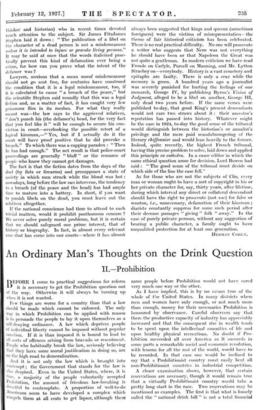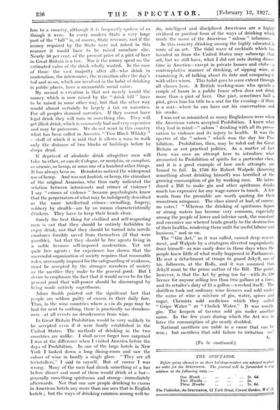An Ordinary Man's Thoughts on the Drink Question II. --P
rohibition BEFORE I come to practical suggestions for reform it is necessary to get the Prohibition question out of the way. Otherwise it will always be turning up when it is not wanted.
Few things are worse for a country than that a law should be made which cannot be enforced. The only way in which Prohibition can be applied with reason is to persuade the people to lay it upon themselves as a self-denying ordinance. A law which deprives people of individual liberty cannot be imposed without popular sanction. If it is thus imposed it is bound to lead to all sorts of offences arising from bravado or resentment. People who habitually break the law, seriously believing that they have some moral justification in doing so, are on the high road to demoralization.
And it is not only the law which is brought into Contempt ; the Government that stands for the law is also despised. Even in the United States, where, it is true, a majority of the people voluntarily accepted Prohibition, the amount of frivolous law-breaking is dreadful to contemplate. A proportion of well-to-do Americans ..seem to have developed a complex which Compels them at all costs to get liquor, although these same people before Prohibition would not have cared very much one way or the other.
As I have implied, this is by no means true of the whole of the United States. In many districts where men and women have only enough, or not much more than enough, money for their necessaries Prohibition is honoured by observance. Careful observers say that there the productive capacity of industry has appreciably increased and that the consequent rise in wealth tends to be spent upon the intellectual amenities of life and upon healthy physical recreations. No doubt if Pro- hibition succeeded all over America as it succeeds in some parts a remarkable social and economic revolution, with lessons for all the rest of the world, would have to be recorded. In that case one would be inclined to say that a Prohibitionist country must easily beat all non-Prohibitionist countries in industrial competition.
A closer examination shows, however, that certain reservations are necessary, though it would remain true that a virtually Prohibitionist country would take a pretty long start in the race. Two reservations may be mentioned as examples. The first is that what is loosely called the " national drink bill " is not a total financial loss to a country, although it is frequently spoken of as though it were. In every modern State a very large part of the " bill " is, of course, State revenue, and if the Money required by the State were not raised in this manner it would have to be raised somehow else. Nearly 50 per cent. of the present price of a pint of beer in Great Britain is a tax. Nor is the money spent on the estimated value of the drink wholly wasted. In the case of those—the vast majority after all—who drink in moderation, the intercourse, the recreation after the day's toil and so on, which are involved in the habit of drinking in public places, have a measurable social value.
My second re,A:rvation is that not merely would the money which is now raised by the " drink bill " have to be raised in some other way, but that the other way would almost certainly be largely a tax on narcotics. For all peoples demand narcotics. If they cannot have legal drink they will turn to something else. They will get illicit drink, which is commonly bad and very expensive and may be poisonous. We do not want in this country what has been called in America " Two Block Whisky " -- stuff of which it is said that it allows a man to walk only the distance of two blocks of buildings before he drops dead.
If deprived of alcoholic drink altogether men will take to ether, or eau-de-Cologne, or morphia, or camphor, or arsenic, or hemp, or some one of a hundred other things. It has always been so. Herodotus noticed the widespread use of hemp. And was not hashish, or hemp, the stimulant of the original Assassins, who thus early indicated the relation between intoxicants and crimes of violence ? I say " crimes of violence " because psychologists know that the perpetrators of what may be indulgently described as the more intellectual crimes—swindling, forgery, robbery by stealth—are by no means characteristically drinkers. . They have to keep their heads clear.
Surely the best thing for civilized and self-respecting men is not that they should be entirely forbidden to enjoy drink, nor that they should be turned into servile creatures forcibly _saved from themselves (if that were possible), but that they should be free agents living in a noble because self-imposed moderation. Yet not quite free agents ; for experience has shown that the successful organization of society requires that reasonable rules, necessarily imposed for the safeguarding of weakness, must be accepted by the stronger members of society as the sacrifice they make to the general good. But I desire to emphasize the fact that it would never be for the general good that will-power should be discouraged by being made entirely superfluous.
Adam Smith pointed out the significant fact that people arc seldom guilty of excess in their daily fare. Thus, in the wine countries where a via du pays may be had for next to nothing, there is practically no drunken- ness—at all events no drunkenness from wine.
In Great Britain Prohibition would be very unlikely to be accepted even if it were finally established in the United States. The methods of drinking in the two countries are unlike. I shall never forget how surprised I was at the difference when I visited America before the days of Prohibition. In one of the large hotels in New York I looked down a long dining-room and saw the colour of wine in hardly a single glass. " They are all teetotallers," I said to myself. But of course I was wrong. Many of the men had drunk something at a bar before dinner and most of them would drink at a bar— generally something spirituous and strong—immediately afterwards. Not that one saw people drinking to excess in American hotels any more than one sees that in English hotels ; but the ways of drinking common among well-to- do, intelligent and disciplined Americans are a highly civilized or purified form of the ways of drinking which made the name of the American " saloon " infamous.
In this country drinking among the highly educated is more of an art. The tidal wave of cocktails which has invaded us from the United States may submerge that art, but we still have, what I did not note during dinner time in America—except in private houses and clubs—a contemplative manner of drinking, of sipping wine, of examining it, of talking about its date and comparing it with other wines. This habit goes to some extent through all classes here. A British working-man who spends a couple of hours in a public house often does not drink more than a pint of beer. One pint, sometimes half a pint, gives him his title to a seat for the evening—if there is a scat—where he can have out his conversation and his smoke.
I was not so astonished as many Englishmen were when the American voters accepted Prohibition. I knew what they had in mind—" saloon " drinking with all its provo- cation to violence and its injury to health. It was the spectre of the " saloon " which won the day for Pro- hibition. Prohibition, then, may be ruled out for Great Britain as not practical politics. As a matter. of fact there was once an attempt here to introduce what amounted to Prohibition of spirits for a particular class, and it is a good example of how such attempts are bound to fail. In 1736 Sir Robert Walpole_ (knowing something about drinking himself) was horrified at the growing consumption of gin by working men. He intro- duced a Bill to make gin and other spirituous drinks much too expensive for any wage-earner to touch. A few words from the preamble are worth quoting for their monstrous arrogance. The class aimed at had, of course, no votes ! " Whereas the drinking of spirituous liquor or strong waters has become very common, especially among the people of lower and inferior rank, the constant and excessive use whereof tends greatly to the destruction of their healths, rendering them unfit for useful labour and business," and so on.
The " Gin Act," as it was called, caused deep resent- ment, and Walpole by a stratagem diverted unpopularity from himself—as was easily- done in those days when the people knew little of what really happened in Parliament. He sent a detachment of troops to guard Jekyll, one of his .followers, at the Rolls, and it was assumed that Jekyll must be the prime author of the Bill. The point, however, is that the Act by going too far—with its £50 licence for anyone selling less than two gallons at a time, and its retailer's duty of £1 a gallon—wrecked itself. The distillers took out ordinary wine licences and sold under the name, of wine a mixture of gin, water, spices and sugar. Chemists sold medicines which they called " Gripe Water " or " Cholick Water." It was mostly gin. The keepers of taverns sold gin under another name. In the few years during which the Act was in force the consumption of gin nearly doubled.











































 Previous page
Previous page